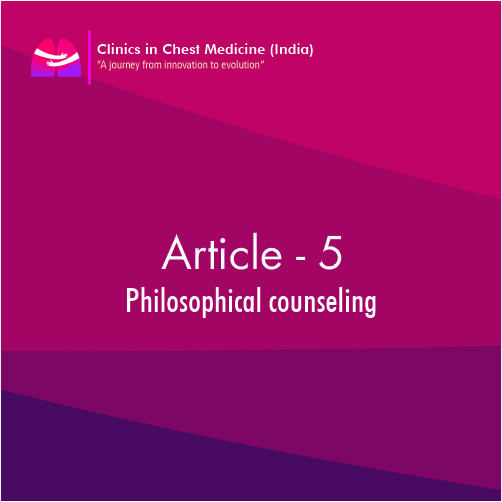Philosophical counseling
Philosophical consultancy, also sometimes called philosophical practice or philosophical counseling or clinical philosophy, is a contemporary movement in practical philosophy. Developing since the 1980s as a profession but since the 1950s as a practice, practitioners of philosophical counseling ordinarily have a doctorate or minimally a master’s degree in philosophy and offer their philosophical counseling or consultation services to clients who look for a philosophical understanding of their lives, social problems, or even mental problems. In the last case, philosophical counseling might be in lieu of, or in conjunction with, psychotherapy. The movement has often been said to be rooted in the Socratic tradition, which viewed philosophy as a search for the Good and the good life.
A life without philosophy was not worth living for Socrates. This led to the philosophy of Stoicism, for example, resulting in Stoic therapy.[1]Peter Koestenbaum at San Jose State University in California was an early figure in philosophical counseling. His 1978 book The New Image of the Person: The Theory and Practice of Clinical Philosophy set out the essential contributions of philosophy to counseling.[2]: 31 His own practice was augmented by extensive training of mental health professionals in applications of philosophical principles. Gerd B. Achenbach and Ad Hoogendijk are two German and Dutch philosophers who established themselves as consultant philosophers in the 1980s[3][4] and led the way to a number of other developments all over the world. They proposed an alternative to psychotherapeutic culture by working exclusively within the field of existential investigation with clients or patients, whom they called ‘visitors’.
The world’s oldest association of philosophical counseling and practice appears to be the German Society for Philosophical Practice and Counseling, which was founded in 1982 by AchenbachPhilosophical consultancy is a relatively new movement in philosophy that applies philosophical thinking and debating to the resolution of a person’s problem. Achenbach argues that it is life that calls to thinking, rather than thinking that informs life. The act of philosophising can, therefore, give direction in its own right, as living precedes thinking and practice precedes theory. A philosophical practitioner helps clients to clarify, articulate, explore and comprehend philosophical
aspects of their belief systems or world views….
Clients may consult philosophical practitioners for help in exploring philosophical problems related to such matters as mid-life crises, career changes, stress, emotions, assertiveness, physical illness, death and dying, aging, meaning of life, and morality. On the other side philosophical practitioners also initiate projects in common life worlds with various goals that are related to essential problems of life, such as sustainable energy, direct democracy, etc. Activities common to philosophical practice include:1. the examination of clients’ arguments and justifications2. the clarification, analysis, and definition of important terms and concepts3. the exposure and examination of underlying assumptions and logical implications4. the exposure of conflicts and inconsistencies5. the exploration of traditional philosophical theories and their significance for client issues6. the initiation of projects for common goods7. all other related activities that have historically been identified as philosophical.[15]







